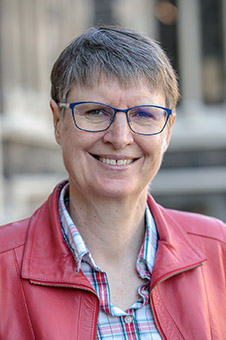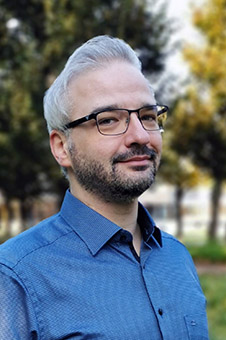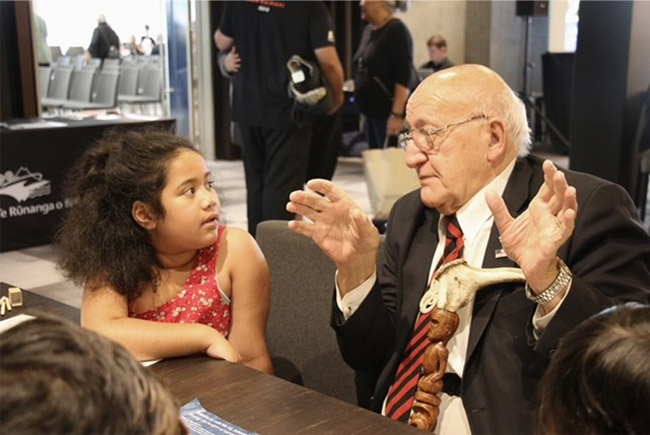Researchers in an international alliance exploring green hydrogen technologies can now push ahead with building their relationship, with funding secured for the venture.

Professor Sally Brooker.
Professor Sally Brooker, of the University of Otago's Department of Chemistry, is co-leading the German-NZ Green Hydrogen alliance which will foster relationships between the two countries, providing significant opportunities for investment and aiming to attract high-value industrial and research partners.
The alliance, which passed the first funding hurdle in February, was born when Dr Paul Jerabek from the Helmholtz-Zentrum Hereon approached Professor Brooker to establish a joint German-New Zealand research centre on green hydrogen, following a call from the German Federal Ministry of Education and Research (BMBF) to fund bilateral green hydrogen initiatives in the Asia-Pacific Research Area (APRA).
Funding for this initiative is shared between BMBF-APRA and New Zealand's Ministry of Business, Innovation and Employment (MBIE).
The MBIE portion, which supports Professor Brooker to co-lead this initiative with Dr Jerabek, was confirmed earlier this year. The German portion, which supports Dr Jerabek and enables the provision of key equipment for the research centre at the University of Otago, as well as networking activities, has just been confirmed.
“I'm thrilled to now have the five years of funding confirmed on both the New Zealand and German side, so together we can really push forward and make things happen,” Professor Brooker says.

Dr Paul Jerabek.
“The establishment of the German-NZ green hydrogen research centre at Otago will allow researchers from across New Zealand to access some cutting edge technology developed by the Hereon researchers – that will immediately place us in the top four in the world for accurately measuring hydrogen uptake by hydrogen storage materials.”
Dr Jerabek describes New Zealand as an “ideal collaboration partner” for developing, testing and establishing green hydrogen technologies.
“New Zealand is extremely innovation-friendly and rich on renewable energy sources, as well as having a 'can-do' attitude.
“Sally has invested lots of time and effort into bringing together 'Team NZ', and securing support from the University of Otago, the Māori community and government agencies. Without her work, we would have not had the chance to pursue this very exciting opportunity,” he says.
The alliance will also encourage the development of a Southern Innovation campus to focus on industrial applications with economic benefits to New Zealand.
From the outset, Professor Brooker has prioritised building a deep and enduring partnership with Te Rūnanga o Ngāi Tahu.

Tā Tipene O'Regan.
Tā Tipene O'Regan, Upoko of Awarua-Ngāi Tahu Rūnaka, says New Zealand is poised for a dramatic energy and economic transition which, if handled correctly, can significantly boost our economy, while protecting our environment for future generations.
“Green hydrogen, produced right here in Southland, would be a significant source of jobs, skills and export revenue for our region, while continuing our contribution to the advancement of the New Zealand economy.
“We are thrilled to see this work recognised by Government funding both here and abroad, and we have high hopes that this is the first step towards greater support for our energy transition. Iwi, Central Government, business and academia all need to work together if we are to seize the opportunity before us," he says.
Professor Brooker has brought together researchers from universities, polytechnics, Crown Research Institutes (GNS & Scion), the MacDiarmid Institute, Ara Ake, and Callaghan Innovation. These scientists are working with private sector experts and the New Zealand Hydrogen Council to build a national 'Team Green Hydrogen' to partner with German researchers and industries.
For example, Professor Brooker has already built connections with Christchurch Airport, Airbus and Air New Zealand.
Claire Waghorn, Christchurch Airport Sustainable Transition Leader, says this latest development in the German-NZ Hydrogen relationship is “very encouraging”.
“We are pleased to see this international collaboration and expertise sharing, particularly in a field that has significant potential to assist this country's decarbonisation. The aviation sector globally is signalling the future for decarbonised aviation will include green hydrogen, and we are eager to support that transition,” she says.
Professor Richard Blaikie, Deputy Vice-Chancellor, Research and Enterprise, is excited about the opportunities the alliance will offer, not only for Otago, but New Zealand.
“The ability for New Zealand's abundant potential for renewable electricity generation to be converted into green hydrogen will provide a strong and sustainable platform for meeting our future energy and export needs. Through the strong links with German research and industry that this platform will build, pathways to adoption of green hydrogen in both countries will be strengthened and high-level training will be provided for people that will be required for our future hydrogen-based industries.”
For more information, contact:
Professor Sally Brooker
Department of Chemistry
University of Otago
Tel +64 3 479 7919
Email sbrooker@chemistry.otago.ac.nz
Ellie Rowley
Communications Adviser
External Engagement Division
University of Otago
Tel +64 3 479 8200
Mob +64 21 278 8200
Email ellie.rowley@otago.ac.nz
Find an Otago Expert
Use our Media Expertise Database to find an Otago researcher for media comment.